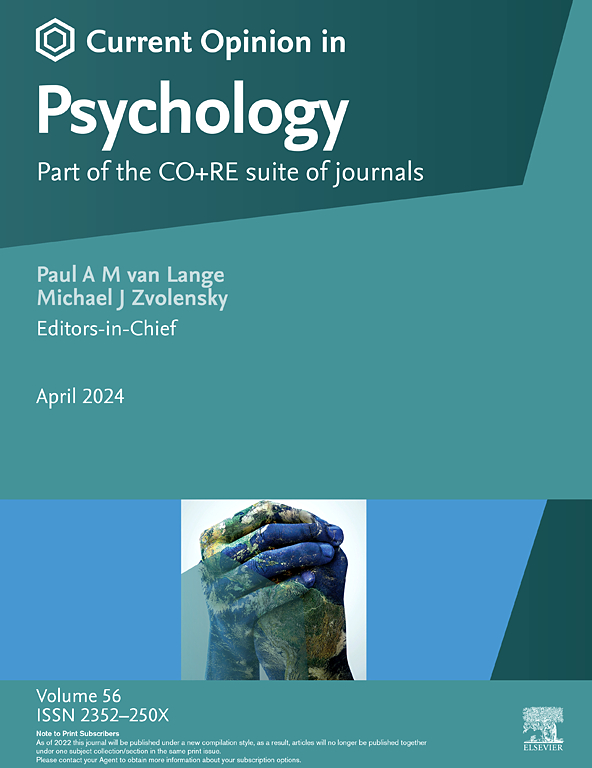Failures in cognitive behavior therapy: The state of the art
IF 6.9
2区 心理学
Q1 PSYCHOLOGY, MULTIDISCIPLINARY
引用次数: 0
Abstract
The aim of this review is to evaluate the state of the art of studies investigating failures in cognitive behavior therapy (CBT). The last couple of years relatively few studies have specifically focused on failures in CBT. Generally, clinicians underestimate the number of therapies that fail and therapists are no better than chance at predicting effectiveness classification. In patients treated in outpatient clinics, effects of therapy were lower than effects of therapy in disorder-specific CBT efficacy randomized controlled trials.
In eating disorders, results of CBT are moderate with high remission rates. In severe eating disorders compassion focused therapy was more effective than CBT at one year follow-up among patients with a history of childhood trauma. Co-morbid personality disorders and depression were significant negative predictors of treatment response in CBT. Few studies have investigated which processes are associated with failure of CBT in patients with PTSD. Drop-out rates for treatments for adult PTSD are rather high. One study reported significantly more drop-outs in cognitive processing therapy compared with exposure therapy.
There is only limited evidence that CBT including dialectical behavior therapy and schema therapy are more effective than treatment as usual especially with patients with borderline personality disorder.
To prevent failures in CBT, a good working alliance is of high importance. Engagement in measurement-based care may help to prevent treatment failures as well.
认知行为疗法的失败:最新进展
本综述的目的是评估认知行为治疗(CBT)失败的研究现状。在过去的几年里,很少有研究专门关注CBT的失败。一般来说,临床医生低估了治疗失败的数量,治疗师在预测疗效分类方面并不比机会好。在门诊治疗的患者中,治疗效果低于疾病特异性CBT疗效随机对照试验的治疗效果。在饮食失调方面,CBT的效果是温和的,缓解率高。在有儿童创伤史的严重饮食失调患者中,以同情为中心的治疗在一年的随访中比CBT更有效。共病型人格障碍和抑郁是CBT治疗反应的显著负向预测因子。很少有研究调查哪些过程与PTSD患者的CBT失败有关。成人创伤后应激障碍治疗的退出率相当高。一项研究报告,与暴露疗法相比,认知加工疗法的辍学率明显更高。只有有限的证据表明,CBT包括辩证行为疗法和图式疗法比常规治疗更有效,特别是对边缘型人格障碍患者。为了防止CBT失败,一个良好的工作联盟是非常重要的。参与以测量为基础的护理也可能有助于预防治疗失败。
本文章由计算机程序翻译,如有差异,请以英文原文为准。
求助全文
约1分钟内获得全文
求助全文
来源期刊

Current Opinion in Psychology
PSYCHOLOGY, MULTIDISCIPLINARY-
CiteScore
12.10
自引率
3.40%
发文量
293
审稿时长
53 days
期刊介绍:
Current Opinion in Psychology is part of the Current Opinion and Research (CO+RE) suite of journals and is a companion to the primary research, open access journal, Current Research in Ecological and Social Psychology. CO+RE journals leverage the Current Opinion legacy of editorial excellence, high-impact, and global reach to ensure they are a widely-read resource that is integral to scientists' workflows.
Current Opinion in Psychology is divided into themed sections, some of which may be reviewed on an annual basis if appropriate. The amount of space devoted to each section is related to its importance. The topics covered will include:
* Biological psychology
* Clinical psychology
* Cognitive psychology
* Community psychology
* Comparative psychology
* Developmental psychology
* Educational psychology
* Environmental psychology
* Evolutionary psychology
* Health psychology
* Neuropsychology
* Personality psychology
* Social psychology
 求助内容:
求助内容: 应助结果提醒方式:
应助结果提醒方式:


